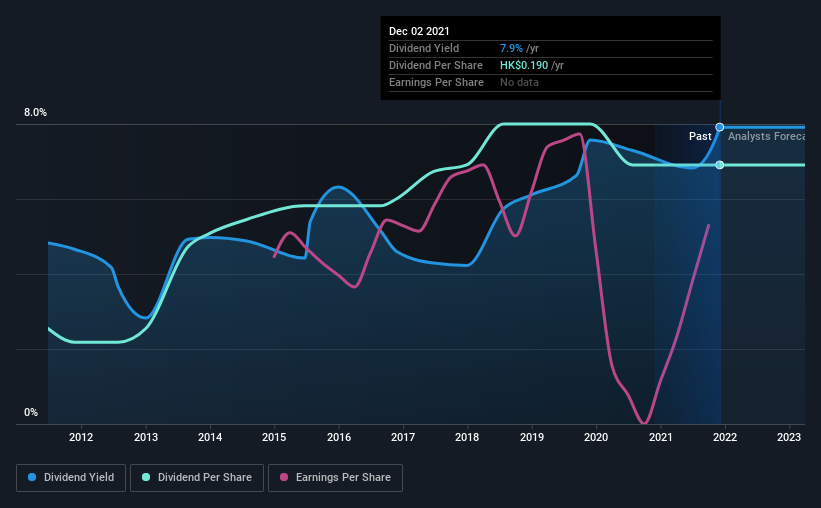- Hong Kong
- /
- Real Estate
- /
- SEHK:35
Far East Consortium International (HKG:35) Will Pay A Dividend Of HK$0.04

Far East Consortium International Limited (HKG:35) has announced that it will pay a dividend of HK$0.04 per share on the 16th of February. This means the annual payment is 7.9% of the current stock price, which is above the average for the industry.
See our latest analysis for Far East Consortium International
Far East Consortium International's Earnings Easily Cover the Distributions
If the payments aren't sustainable, a high yield for a few years won't matter that much. However, prior to this announcement, Far East Consortium International's dividend was comfortably covered by both cash flow and earnings. This means that most of what the business earns is being used to help it grow.
Over the next year, EPS is forecast to fall by 20.7%. If the dividend continues along recent trends, we estimate the payout ratio could be 47%, which we consider to be quite comfortable, with most of the company's earnings left over to grow the business in the future.

Dividend Volatility
The company's dividend history has been marked by instability, with at least 1 cut in the last 10 years. The first annual payment during the last 10 years was HK$0.07 in 2011, and the most recent fiscal year payment was HK$0.19. This means that it has been growing its distributions at 11% per annum over that time. Dividends have grown rapidly over this time, but with cuts in the past we are not certain that this stock will be a reliable source of income in the future.
Dividend Growth May Be Hard To Achieve
With a relatively unstable dividend, it's even more important to see if earnings per share is growing. Although it's important to note that Far East Consortium International's earnings per share has basically not grown from where it was five years ago, which could erode the purchasing power of the dividend over time.
In Summary
In summary, while it's good to see that the dividend hasn't been cut, we are a bit cautious about Far East Consortium International's payments, as there could be some issues with sustaining them into the future. The payments haven't been particularly stable and we don't see huge growth potential, but with the dividend well covered by cash flows it could prove to be reliable over the short term. We would probably look elsewhere for an income investment.
Companies possessing a stable dividend policy will likely enjoy greater investor interest than those suffering from a more inconsistent approach. However, there are other things to consider for investors when analysing stock performance. For example, we've identified 4 warning signs for Far East Consortium International (2 are a bit concerning!) that you should be aware of before investing. Looking for more high-yielding dividend ideas? Try our curated list of strong dividend payers.
New: AI Stock Screener & Alerts
Our new AI Stock Screener scans the market every day to uncover opportunities.
• Dividend Powerhouses (3%+ Yield)
• Undervalued Small Caps with Insider Buying
• High growth Tech and AI Companies
Or build your own from over 50 metrics.
Have feedback on this article? Concerned about the content? Get in touch with us directly. Alternatively, email editorial-team (at) simplywallst.com.
This article by Simply Wall St is general in nature. We provide commentary based on historical data and analyst forecasts only using an unbiased methodology and our articles are not intended to be financial advice. It does not constitute a recommendation to buy or sell any stock, and does not take account of your objectives, or your financial situation. We aim to bring you long-term focused analysis driven by fundamental data. Note that our analysis may not factor in the latest price-sensitive company announcements or qualitative material. Simply Wall St has no position in any stocks mentioned.
About SEHK:35
Far East Consortium International
An investment holding company, engages in the property development and investment activities in Australia, New Zealand, the Czech Republic, Hong Kong, Malaysia, the People’s Republic of China, Singapore, the United Kingdom, and the rest of Europe.
Undervalued with mediocre balance sheet.


